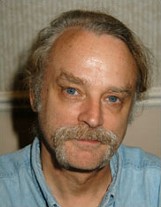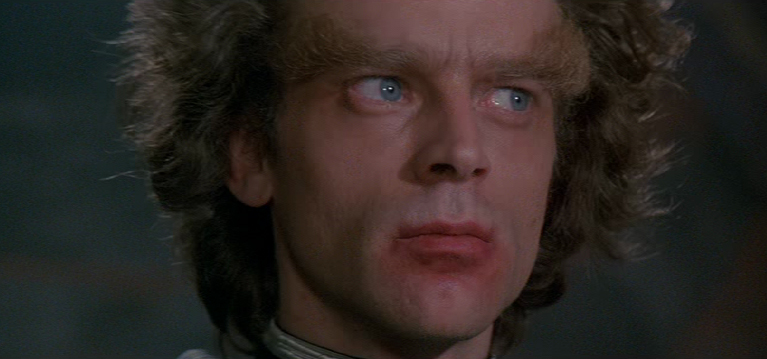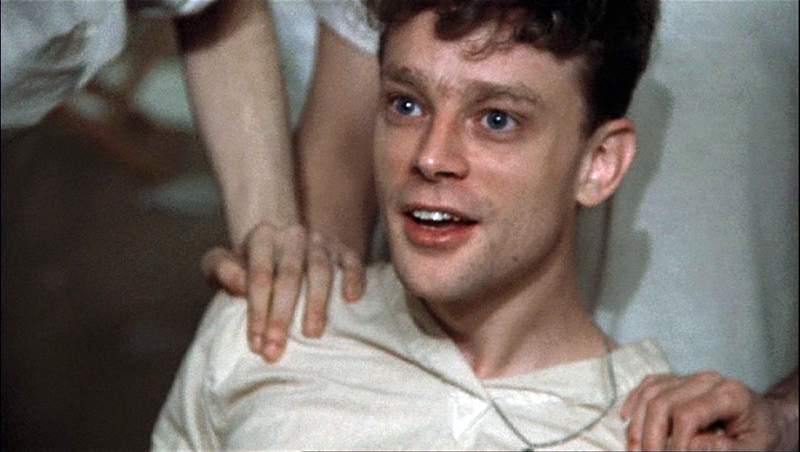 Craig here with the last ‘Take Three’. For this final, and slightly differently themed, entry I chose Brad Dourif, perhaps one of the finest character/supporting actors. Next week there will be a special wrap-up post for this third season of Take Three.
Craig here with the last ‘Take Three’. For this final, and slightly differently themed, entry I chose Brad Dourif, perhaps one of the finest character/supporting actors. Next week there will be a special wrap-up post for this third season of Take Three.
Take One: Dourif & Auteurs
The sign of a great character actor can often be seen in the directors they work with. Of course not all will be universally lauded names (character actors don’t get to pick and choose like A-list stars), but when they repeatedly work with filmmakers of high regard you know there’s something special about them. Dourif has worked with some of the most visionary and celebrated directors working. The likes of Werner Herzog and David Lynch, whose off-kilter approach perfectly chimes with Dourif’s, have cast him time and again. Herzog first cast him in the mountaineering-themed Scream of Stone (1991) which led to The Wild Blue Yonder (2005) and the 2009 double The Bad Lieutenant: Port of Call New Orleans and My Son, My Son, What Have Ye Done (in the former he had a one-off scene as Nic Cage’s bookie and in the latter he played Michael Shannon’s ostrich-farm-running uncle). But his most mesmerising performance for Herzog was as The Alien in Yonder, where he talked us through documentary footage, ice ages and space missions with oddball charm and an innate ability to unnerve.

He was Lynch’s go-to character actor in a pair of his ‘80s films, Dune and Blue Velvet. [more...]
In both he played right-hand man to a twisted villain: the elaborately-eyebrowed Piter De Vries worked for boil-in-the-bag baddie Baron Harkonnen in the former; twitchy weirdo Raymond worked for gas-guzzling nutjob Frank Booth in the latter. Even without Herzog and Lynch, Dourif has an enviable auteur roster: Spike Lee (Jungle Fever), Jean-Pierre Jeunet (Alien Resurrection), Peter Jackson (The Lord of the Rings: The Two Towers/The Return of the King), Ken Loach (Hidden Agenda), Dario Argento (Trauma), Michael Cimino (Heaven’s Gate), Miloš Forman (Ragtime; see Take Three for One Flew Over the Cuckoo’s Nest).
Take Two: Dourif & Chucky
Chucky, the toy doll demonically possessed by the spirit of a deceased serial strangler Charles Lee Ray, is perhaps Dourif’s most famous role. Despite the fact that we only actually briefly see him on screen, Dourif cemented his cult status among film fans with his voice work as the Good Guy doll gone bad. In his own way, over five films (from Child's Play in 1988 through Seed of Chucky in 2004) he’s become as synonymous with the Chucky films as, say, Bruce Willis is with Die Hard or Darth Vader with Star Wars. As the wretched pint-sized murderer, he trash-compacts, burns, electrocutes, stabs (then photocopies), air-pumps, suffocates, explodes, strangles and shoots a variety of poor victims. He even drives “Britney Spears” off the road in Seed. He’s had a wife (Jennifer Tilly in Bride) and a son (Billy Boyd in Seed) and a never-ending grudge over six maniacal outings. Dourif’s voice work contained a uniquely evil inflection. His sneering, whiny vocals are heightened to a hammy degree and are topped off with a fitting juvenile snarl. There are grim, guilty laughs to be had as he liberally peppers his lines with as many swear words as possible; a line of dialogue from Chucky is like listening to a Tourette’s sufferer fire a curse cannon. Dourif gives it such demented relish that it’s clear he enjoys every diabolical word. A fifth sequel, Curse of Chucky, with Dourif returning, is due next year, proving that a full and unhealthy re-animated life as a devil doll has reaped career rewards for Dourif. He’ll always be Chucky, your friend till the end. Hi-de-ho.

Take Three: Dourif & the ‘70s
Although Dourif’s supporting career bloomed during the eighties, two of his best roles came in the mid-to-late seventies. With both Miloš Forman’s One Flew Over the Cuckoo’s Nest (1975) and John Huston’s Wise Blood (1979) he showed great emotional range but also an innocently queasy agitation and an all-round peculiar intensity both of which would become endearingly familiar signatures. Wise Blood, based on Flannery O’Connor’s 1952 novel, was a rare beast indeed: a genuine cult oddity, hard to fathom, tricky to sum up yet easy to admire for its staunchly uncommercial tone. It was a perfect vehicle for a left-field actor seeking to make a unique mark on the film map. Dourif excelled in his first lead role, as wounded war veteran Hazel Motes who returns to his Tennessee home to set up the anti-God ‘Holy Church of Christ Without Christ’. One of the most subtly astounding things about Dourif’s performance is its sheer unpredictability. You’re never sure what Motes is thinking – and therefore where Dourif will steer the role. It’s an untethered piece of acting, free of cliché and compacted with mystery. Each of his mannerisms and actions comes as a fresh surprise. Cuckoo’s Nest was of course Jack Nicholson's show but it brought Dourif a nomination for Best Supporting Actor Oscar. Dourif made the strongest and most affecting impact from the supporting cast as stuttering hospital inmate Billy Bibbit. Two scenes opposite Louise Fletcher’s Nurse Ratched stand out: first, when she questions him about his first suicide attempt; second, when she catches him with a prostitute. He plays these moments with boyish nervousness and unguarded apprehension. He perfectly captured the demeanour of a troubled man not quite ready for the world, but one who so desperately needs to embrace it. It’s a heartbreaking part that Dourif slowly polishes into a powerfully lasting acting achievement.
Three more films for the taking: Eyes of Laura Mars (1978), The Exorcist III (1990), The Wizard of Gore (2007)